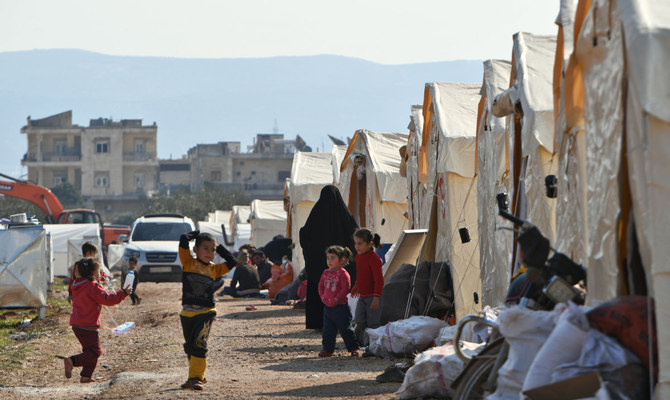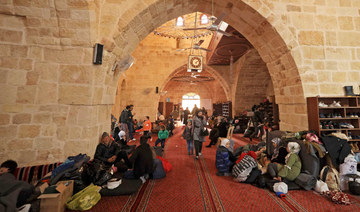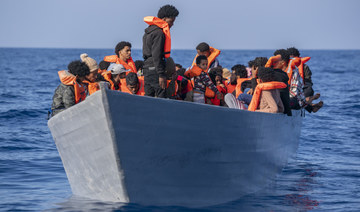UNITED NATIONS: The UN humanitarian chief warned Thursday that the 12-year conflict in Syria has pushed 90 percent of its population below the poverty line, and that millions face cuts in food aid next month because of a funding shortfall.
Martin Griffiths said that the $5.4 billion UN humanitarian appeal for Syria – the world’s largest – is only 12 percent funded, meaning that emergency food aid for millions of Syrians could be cut by 40 percent in July.
Griffiths delivered the grim news to the UN Security Council along with an appeal to members to renew the authorization for the delivery of aid to the country’s rebel-held northwest from Turkiye, which expires July 10.
But Russia’s UN ambassador, whose country is Syria’s most important ally, called the cross-border aid deliveries “a zero-sum game” that is undermining Syria’s sovereignty, discriminating against government-controlled territory, and fueling illegal armed groups including “terrorists in Idlib.”
Syria’s uprising-turned conflict, now in its 13th year, has killed nearly half a million people and displaced half of its prewar population of 23 million. A deadly 7.8 magnitude earthquake rocked large swaths of Syria in February, further compounding its misery.
Griffiths, the undersecretary-general for humanitarian affairs who returned Wednesday from Damascus, said the Syrian people are facing “profound humanitarian challenges.” He said they were gathering Thursday on the Muslim holy day Eid Al-Adha “with less food on their plates, little fuel in their stoves, and limited water in their homes” and their hardship comes at a time when the UN and its humanitarian partners have limited means to help.
Russia’s Ambassador Vassily Nebenzia said the emergency humanitarian appeal for $397 million to help earthquake victims was funded in the first months, but the overall UN appeal for Syria was only 12 percent funded near the end of June. And he accused the US and its allies of spending far more on weapons for Ukraine than the $55 billion the UN is seeking for global humanitarian needs this year, saying “this lays out Western priorities very clearly.”
Britain’s UN Ambassador Barbara Woodward retorted that the UK’s $190 million pledge on June 15 brought their contribution to Syria to over $4.8 billion to date and said: “I look forward to Russia announcing its contribution in due course following the recent announcement that Russia spends $2 billion a year on the Wagner Group.”
Russia’s President Vladimir Putin said Tuesday, after the founder of the Wagner mercenary group, Yevgeny Prigozhin, and his forces staged a revolt inside Russia, that Wagner and its founder had received almost $2 billion from the Russian government in the past year.
Woodward, who visited the Turkish-Syria border earlier this month, echoed Secretary-General Antonio Guterres’ call for a 12-month extension of the authorization for cross-border aid deliveries to ensure humanitarian access to 4.1 million people in Syria’s northwest.
In January, the council approved a resolution extending humanitarian aid deliveries to Idlib for six months until July 10 as Russia demanded. Many of the people sheltering in the area have been internally displaced by the conflict. The resolution allowed for aid deliveries to continue through the Bab Al-Hawa crossing, but after the earthquake Syria’s President Bashar Assad allowed aid to go through two additional crossings at Bab Al-Salameh and Al-Rai.
US deputy ambassador Jeffrey DeLaurentis, who said the United States made its largest commitment to Syria of $920 million on June 15, called it “essential” to keep all three crossings open for 12 months. He cited Guterres’ latest report which said anything less would be inadequate to meet humanitarian needs in the northwest which have never been greater. The UN chief called it “a moral and humanitarian imperative.”
Russia and Syria have pressed for aid deliveries to the northwest across conflict lines and UN aid chief Griffiths said a 10-truck convoy from Aleppo recently traveled from Aleppo to Idlib safely, with aid for some 22,000 people. But Russia’s Nebenzia dismissed it as the only cross-line delivery in the last six months “clearly timed to coincide with today’s meeting.”
“Do you seriously expect us to consider the situation with cross-line convoys to be satisfactory after this?,” he asked.
Griffiths said expanding early recovery programs – another key Syrian and Russian demand – “is the humanitarian community’s best chance to support the future of the Syrian people.”
He urged a stronger international consensus on the importance of these programs and a relaxation of rules to allow not only vocational training but mentoring for young people, construction of irrigation systems without qualifying them as “development” projects, and the opening of schools regardless of whether they are described as “rehabilitated” or “reconstructed.”
UN warns that 90% of Syrians are below the poverty line, while millions face cuts in food aid
https://arab.news/n5veq
UN warns that 90% of Syrians are below the poverty line, while millions face cuts in food aid

- Griffiths said expanding early recovery programs – another key Syrian and Russian demand – “is the humanitarian community’s best chance to support the future of the Syrian people”
22 dead in shelling of Sudan’s besieged El-Fasher: medic
A doctor at the city’s Saudi Hospital said “bombardment of the livestock market and the Redayef neighborhood killed 22 people and wounded 17“
PORT SUDAN: Besieging Sudanese paramilitary forces pounded El-Fasher on Saturday, witnesses said, killing 22 people in Darfur’s last city outside their control, according to a hospital source.
El-Fasher has become a key battleground in the 15-month-long war pitting the paramilitary Rapid Support Forces (RSF) against the regular army.
The battle for the North Darfur state capital, seen as crucial for humanitarian aid in a region on the brink of famine, has raged for more than two months.
Witnesses said El-Fasher had come under heavy artillery bombardment by the RSF on Saturday.
“Some houses were destroyed by the shelling,” one witness said.
A doctor at the city’s Saudi Hospital told AFP on condition of anonymity that “bombardment of the livestock market and the Redayef neighborhood killed 22 people and wounded 17.”
It was the deadliest reported bombardment since the start of the month, when 15 civilians were killed in the shelling of another city market.
Intense fighting for El-Fasher erupted on May 10, prompting a siege by the RSF that has trapped hundreds of thousands of civilians.
Last month, the UN Security Council passed a resolution demanding an end to the siege.
US mediators are to make a new attempt in Switzerland next month to broker an end to the fighting. The talks are due to open on August 14.
Previous negotiations in Jeddah, Saudi Arabia, have failed to put an end to the fighting which has displaced millions, sparked warnings of famine and left swathes of the capital Khartoum in ruins.
Egypt’s presence at Gaza talks highlights its ‘pivotal role’ in region, says analyst

- Meeting in Rome fuels hope amid concerns that Israel is sabotaging peace negotiations
CAIRO: The presence of Egyptian delegates at a scheduled meeting in Rome to discuss a ceasefire in Gaza underscores Cairo’s “pivotal role” in the region, political analyst and MP Osama Al-Ashmouni told Arab News on Saturday, adding that it also shows Egypt’s unquestionable commitment to the Palestinian cause.
Egypt — along with Qatar and the US — has been involved in months of mediation efforts aimed at ending the war that has raged in the Gaza Strip for more than nine months.
A senior source told the Cairo News Channel that a meeting involving Egyptian, US, and Qatari officials and the head of Israeli Intelligence will take place in Rome on Sunday, in the hopes of developing an agreement that would immediately halt military engagements and guarantee the entry of humanitarian aid into Gaza.
The source said Egyptian authorities have stressed the importance of reaching an agreement that ensures the free movement of Gaza’s citizens and a complete withdrawal from the Rafah crossing.
Al-Ashmouni told Arab News that Egypt “has been a stalwart supporter of the Palestinian cause throughout its history, offering tremendous support to defend the rights of the Palestinian people and their quest to reclaim their occupied land and establish a Palestinian state.”
Al-Ashmouni added that Israel “consistently disseminates falsehoods and continues its deceptive practices and lies, whether in distorting Egypt’s role in supporting the Palestinian cause or by trying to portray itself as the victim, thereby reversing the roles of victim and perpetrator.
“It is crucial for attendees at the Rome meeting to recognize this, as the conscience of the free world should not heed the fabrications spread by the Israeli propaganda machine, despite the international community’s passive stance on Israel’s actions, which include crimes against humanity and war crimes against the unarmed Palestinian people in Gaza.”
Al-Ashmouni expressed his hope that the negotiations in Rome would prove effective, although he anticipates that Israel will continue what he called its policy of sabotaging peace negotiations.
Journalist Mahmoud Mosalam, a member of the Egyptian Senate, told Arab News that Egypt plays a crucial role in mediation talks amid “intense accusations by Israel and other parties who would prefer Egypt to withdraw from the role.”
Mosalam added: “They allege that Egypt is facilitating arms smuggling to the resistance, and some American media outlets falsely claim that Egypt has altered texts from previous negotiations.”
He hopes the negotiations in Rome, which will also include Palestinian and Italian officials, “will be fruitful and help Gaza emerge from its severe crisis, a situation akin to actual genocide.”
He added that the recent outpouring of global support for the Palestinian people gives them an opportunity that they must seize and said it is inevitable the war will end, which would present the Palestinian leaders with “significant responsibilities,” including the reconstruction of Gaza and the reorganization of the Palestinian administration in preparation for a “comprehensive resolution” of the Palestinian issue.
Heat wave forces Iran to shutter government offices and banks. Electricity consumption soars

- Banks, offices, and public institutions across the country close to protect people’s health and conserve energy, due to extreme temperatures
TEHRAN: A heat wave blanketing Iran has forced authorities to cut operating hours at various facilities Saturday and order all government and commercial institutions to shutter on Sunday.
The temperature ranged from 37 degrees Celsius (98.6 degrees Fahrenheit) to 42 C (about 107 F) in the capital, Tehran on Saturday, according to weather reports.
State-run IRNA news agency said banks, offices, and public institutions across the country would close on Sunday to protect people’s health and conserve energy, due to extreme temperatures and that only emergency services and medical agencies would be excluded.
Authorities also cut working hours on Saturday in many provinces due to the sweltering heat, IRNA reported, adding that high temperatures, over 40 C (104 F), have been registered in Tehran since Friday.
Iranian media warned people to stay indoors until 5 p.m. local time.
Authorities also said electricity consumption reached record levels of 78,106 megawatts on Tuesday.
Nournews, close to Iran’s Supreme National Security Council, reported Wednesday that Iran’s temperature is rising at twice the pace of the global temperature which has increased by more than one degree compared to the long-term average. Meanwhile, Iran has become warmer by 2 degrees over the past 50 years, the agency said.
Last year, Iran ordered a two-day nationwide holiday due to increasing temperatures.
170 killed in days-long Israeli operation, says Gaza civil defense

- Deir Al-Balah is one of the areas most populated with displaced families, and said over 100 others were wounded
GAZA: Gaza’s civil defense agency said Saturday that Israel’s military operation around Khan Yunis has killed about 170 people and wounded hundreds since it started on Monday.
“Since the beginning of the Israeli military operation in the Khan Yunis area, we are talking of approximately 170 martyrs and hundreds of wounded,” agency spokesman Mahmud Bassal told AFP.
He said many people had been displaced again on Saturday as the Israeli operation continued.
“The questions is where will these residents go?” Basal said.
“Anyone who sees the situation in Khan Yunis will witness thousands of people spread out on the ground, on the roads, in areas that unfortunately are not suitable for living.
“With no other options available, they are exposing themselves to death.”
Earlier on Saturday the military issued new evacuation orders for residents of the southern city, after retrieving the bodies of five Israelis and warning of new operations.
The United Nations said more than 180,000 Palestinians have fled Khan Yunis since the Israeli operation began on Monday.
The evacuation orders and “intensified hostilities” have “significantly destabilized aid operations,” it added, reporting “dire water, hygiene and sanitation conditions” across the Palestinian territory.
The Israeli military said it launched the operation to halt rocket fire from the area, which already saw heavy fighting earlier this year.
On Wednesday, it said troops had retrieved the bodies of five Israelis from the area.
They had been killed during the Hamas attacks of October 7 and their bodies taken back to Gaza, the military said.
On Saturday, it ordered residents from more parts of Khan Yunis “to temporarily evacuate to the adjusted humanitarian area in Al-Mawasi” — the second such adjustment made to the safe zone within a week.
Israel orders the evacuation of an area designated as a humanitarian zone in Gaza

- The war in Gaza has killed more than 39,100 Palestinians, according to the territory’s Health Ministry
KHAN YOUNIS: Israel’s military ordered the evacuation Saturday of a crowded part of Gaza designated as a humanitarian zone, saying it is planning an operation against Hamas militants in Khan Younis, including parts of Muwasi, a makeshift tent camp where thousands are seeking refuge.
The order comes in response to rocket fire that Israel says originates from the area. It’s the second evacuation issued in a week in an area designated for Palestinians fleeing other parts of Gaza. Many Palestinians have been uprooted multiple times in search of safety during Israel’s punishing air and ground campaign.
On Monday, after the evacuation order, multiple Israeli airstrikes hit around Khan Younis, killing at least 70 people, according to Gaza’s Health Ministry, citing figures from Nasser Hospital.
The area is part of a 60-square-kilometer (roughly 20-square-mile) “humanitarian zone” to which Israel has been telling Palestinians to flee to throughout the war. Much of the area is blanketed with tent camps that lack sanitation and medical facilities and have limited access to aid, United Nations and humanitarian groups say. About 1.8 million Palestinians are sheltering there, according to Israel’s estimates. That’s more than half Gaza’s pre-war population of 2.3 million.
The war in Gaza has killed more than 39,100 Palestinians, according to the territory’s Health Ministry, which doesn’t distinguish between combatants and civilians in its count. The UN estimated in February that some 17,000 children in the territory are now unaccompanied, and the number is likely to have grown since.
The war began with an assault by Hamas militants on southern Israel on Oct. 7 that killed 1,200 people, most of them civilians, and took about 250 hostages. About 115 are still in Gaza, about a third of them believed to be dead, according to Israeli authorities.
















